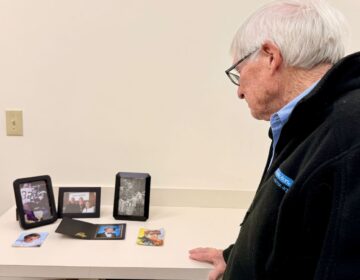The so-called ‘life’- Delaware’s sex trade, Part 1

(images via Delaware State Police;illustration/WHYY)
For the past several months, WHYY’s Zoë Read has been interviewing experts about prostitution and sex trafficking in Delaware. WHYY will publish a chapter of the story each day of the week.
Click here to read Part 2; Advocating from the Ground up, click here to read Part 3; Advocates Work to End Trafficking, click here to read Part 4; A Judicial Approach and here to reach Part 5; Crime, Punishment and Redemption.
The So-Called “Life”
Tammie still has “the walk.”
The way of moving only recognizable to men on their lunch break looking to pick up women off the street.
“I’ve been doing it since I was 15,” Tammie, 48, said. “I’ve been walking the same way my whole life.”
Her gait and stare used to be intentional to lure men—now it’s unconscious.
When men pull their car over, Tammie, a sex trafficking survivor, continues walking—after a sarcastic comment: “What, you gonna buy me lunch?”
Tammie was involved in prostitution—also known as “the life”— for 30 years. She battled a meth addiction for decades.
“By the time I was [in my 20s] I was at 1,000 guys. By the time I was 45, probably 3 or 4 thousand,” said Tammie, who has been clean off drugs for more than three years. “I’ve been raped, I’ve been stabbed, I’ve been put in the hospital, I’ve been shot at.”
Erica, 28, has been in the life for about 12 years. A transgender woman, Erica dropped out of high school and ran away from foster care at 16. She has been homeless and involved in prostitution ever since.
“I keep my condoms in my pocket book and if I need a couple dollars I go out and find someone,” Erica said. “It’s like a game. Just to see who’s out and who you buck up on.”
She said she’s become immune to the life—but she wants to see the light at the end of the tunnel.
“It’s a lot of dangerous situations I put myself in and I’m getting to that point I’m getting really tired,” she said. “It just gets to the point I’m waiting for death.”
Advocates say there are hundreds of women and some men in Delaware who, like Tammie and Erica, struggle day-to-day with the hardships of prostitution.
Many of the women were trafficked and forced into prostitution as children or adults.
Others got into the life to fund their drug addiction, or as a way to support themselves financially when no other option was available.
Many of the women involved in prostitution, trafficked or not, have traumatic histories or deep-rooted personal issues.
Unlike surrounding states, such as Maryland and Pennsylvania, advocates say Delaware falls behind when collecting key data about sex trafficking and prostitution and providing services to the women.
But now several individuals, organizations and state officials are putting the issue in the spotlight by educating law enforcement, health officials and the general public, and by building programs that help women transition out of the life.
Law enforcement also is finally targeting traffickers, as opposed to the women, two years after legislation was passed into law to tackle the issue.
“For us to say, ‘We don’t have any stats here, so it’s not happening,’ is ludicrous,” said Yolanda Schlabach of Zoë Ministries, an organization dedicated to eliminating sex trafficking in Delaware.
“We don’t have stats because we don’t look for it. We think it’s happening overseas or in New York City or Washington, D.C. For the most part the general public is unaware we have a major issue with human trafficking in Delaware.”
There are professional women, often called “escorts,” who say they feel empowered, who charge thousands of dollars for services and can choose their clients.
But on the other end of the spectrum are women struggling to survive.
Women involved in prostitution pick up men in key areas, like Maryland Avenue, New Castle Avenue and DuPont Highway in Wilmington and parts of New Castle.
They also perform sex acts in cheap motels along those highways and across the state, often while their pimps wait nearby.
Women who are trafficked in Asia and brought to the U.S. are forced to perform sex acts in illicit massage businesses.
These women risk their lives every day, meeting as many clients as possible, often just to survive—to be able to eat, support their drug dependency or to avoid a beating from their pimp.
“It’s all over. In the high rises, in the back alleys, underneath a table, in a restaurant, in a bathroom, at a beauty shop—anywhere somebody got some money and there’s a place where there’s a little bit of seclusion. Those kind of jobs can be done in five minutes or less,” said Edwina Bell, an advocate who uses her own experience to help other women.
“The history of sex and money goes back to when men found out they can get some and women found out men are willing to pay for it.”
Bell said prices can range from as high as $5,000, to an average of $150—to as little as a bite to eat. The women who are feeding an addiction will work for very little, around $10 for oral sex—just enough to support their habit.
“Often these women who are on the lower level get more or less cheated, because the person may say, ‘You didn’t do your job well enough,’ or, ‘Bitch I ain’t giving you nothing,’ or take the money back under force, which is why you have these brothels set up in a more controlled area,” Bell said.
Sgt. Richard Bratz of the Delaware State Police said in 2015, 27 individuals were charged with prostitution and seven were charged with patronizing a prostitute in New Castle County.
He said in Sussex County there were four defendants facing one count of prostitution and one defendant facing two counts of prostitution. In Kent County there were two defendants facing one count of prostitution and there is also one count of prostitution still listed as pending active, with no arrest, Bratz said.
He said most prostitution occurs due to a hardship or drug dependency. But the police department also has made several arrests at illicit massage businesses over the years, and have more recently targeted trafficking operations. Bratz said the women working at illicit massage businesses, who are Asian immigrants, refuse to discuss any human trafficking issues with investigators.
Delaware doesn’t have any key evidential data on sex trafficking in the state, advocates say. However, in 2014, Maryland’s Human Trafficking Task Force provided services to 381 sex trafficking survivors—373 of them were U.S. citizens and eight were foreign nationals.
More than half were under 18.
“We don’t have the tools in our investigative tool boxes and the training to make that shift to understand we’re not arresting the perpetrator, we’re arresting the victims as prostitutes,” Schlabach said.
“We cite them for prostitution then release them. Nobody’s asking questions about pimps, nobody’s asking questions about traffickers. If you’re not aware trafficking is happening in the state you’re not looking for pimps or traffickers.”
Tammie, whose last name is omitted for her privacy, said she got involved in prostitution when she was 15 or 16 after her ex-husband, then boyfriend, put her in the life.
Tammie, who says she had absent parents and only has a 7th grade education, said her husband frequently brought men home for her to provide services to.
She said after they broke up she remarried, and she and her new husband regularly got high on meth. Tammie said at that point she was “tricking” to support their drug addiction.
“We started doing [Route] 13, and the 13 became my second home,” she said. “I was only doing it to support a habit and not get beat. If he wanted more crank I would have to go out and get more crank.”
Tammie, who has five children and 14 grandchildren, said her addiction led to social services taking her kids away between 1984 and 1992.
She said the hurt she felt from being involved in prostitution was easier to suppress when she was high.
“It’s hard to stay in a car with someone and go down on them,” Tammie said. “Then you start thinking you are trash.”
She said she never met a john, or “trick,” who was kind to her. One man tied her up and raped her with tools, which placed her in the hospital for more than two weeks, Tammie said.
“There was never a good one,” she said.
“I’ve been through some scary stuff. I know I’m street smart, but when you’re getting beat, chocked, shot at, stabbed…”
Erica, whose last name is omitted for her privacy, said she and her siblings were placed in foster care when she was around 10 years old, because their grandmother was physically abusive. They had lived with their grandmother because their parents used drugs, she said.
Erica, who came out as transgender at 13 or 14, said she never felt her gender identity was embraced. She said the lack of support led to her dropping out of high school, running away from foster care and becoming homeless at 16.
“I just wish I could have stayed at the school and the school didn’t put me through so much and were more interested in teaching me more than what I was coming to school dressed as,” Erica said.
“I’m black, I’m transgender and when I do come to school I can’t really focus, I’m being moved from house to house. I was really going through a lot and at that time, I didn’t have nobody.”
She said she began tricking when she was 16 after watching other transgender women picking up men outside nightclubs.
“Then I really would look and see how they would get money real quick. Times got hard being in foster care, and needing money and getting older—it was something I just got into,” Erica said.
“I’m not going to say it was a specific person that told me to start, because no one held a gun to my head.”
She said she originally worked in Philadelphia, advertising herself on Craigslist. Erica had her own phone and didn’t need to be on the streets looking for clients.
But after a brief stint with the law and a medical issue, she decided to return to Delaware to do her work on the street. Erica is phoneless, and sleeps wherever she can.
“I don’t like to have personal relationships with them, it’s about the money. It’s business—boom, boom, boom, boom,” she said. “Sometimes I did have guys that wanted to be personal with me. I had guys that just pay me for my time. Those are the best ones.”
But not all her tricks were such easy clients. Erica laughs as she talks about her experiences getting shot in the leg and being sexually assaulted.
“I’m laughing because I have to hide behind the hurt,” she said. “A lot of transgenders are being killed in Philly. That’s why I’m like, ‘I have to change my life.’”
—–
This is part one of a week-long series looking at prostitution and sex trafficking in Delaware.
WHYY is your source for fact-based, in-depth journalism and information. As a nonprofit organization, we rely on financial support from readers like you. Please give today.





